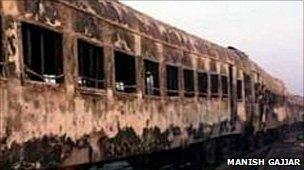India Godhra train blaze verdict: 31 convicted
- Published

Those convicted of the train attack will be sentenced on Friday
A special court in the western Indian state of Gujarat has found 31 people guilty of setting fire to a passenger train in the town of Godhra in 2002.
The court acquitted 63 other people of conspiracy and murder.
The Sabarmati Express was attacked by a Muslim mob killing 59 people, mainly Hindu pilgrims.
The attack led to some of the worst riots seen in India and left more than 1,000 people, mainly Muslims, dead.
Gujarat's authorities were criticised for not doing enough to stop the riots.
Those convicted will be sentenced on Friday. Security is tight across Gujarat and extra police have been deployed in case of communal unrest. All of those accused and convicted were Muslim.
Conspiracy
The attackers were said to have forced the train, carrying Hindu pilgrims from Ayodhya, to stop and then set fire to one of the carriages.
"The court has accepted the conspiracy theory. It was not an accident," public prosecutor JM Panchal is quoted by the AFP news agency as saying.
Whether or not there was a conspiracy to set the train ablaze or whether it was a spontaneous fire has long been the subject of dispute.
An inquiry commission set up by the state government said in 2008 that the burning of the train was a "conspiracy".
It examined more than 1,000 witnesses during a six-year period, found that 140 litres of petrol had been purchased as part of what it said had been a conspiracy to burn the train carriage.
That commission also exonerated Gujarat's Chief Minister Narendra Modi over the deadly religious riots that followed the blaze.
He was accused of failing to halt the religious violence and some opponents said he indirectly encouraged some of the Hindu rioters. But the commission dismissed these allegations.
"There is absolutely no evidence to show that either the chief minister or any of the ministers in his council or police officers played any role in the Godhra incident," Justice GT Nanavati had concluded in his report.
But Mr Modi was criticised in 2010 for his "partisan" stance by a separate Supreme Court panel which investigated the riots.
It said he showed "discriminatory attitude by not visiting riot-affected areas in Ahmedabad where a large number of Muslims were killed," according to Tehelka magazine and AFP news agency.
The inquiry commission's findings contradicted an earlier probe by retired Supreme Court judge Umesh Chandra Banerjee, who found that the coach fire was not deliberately started.
He concluded in 2005 that the fire began by accident.
He said there was evidence to suggest the blaze began inside the train and that it was not fire-bombed.